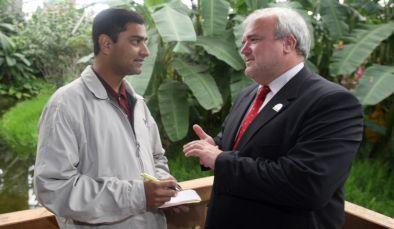Leipzig, 3.11.2011: Germany Scraps Animal Swap Deal with India
 During his time in Leipzig, P M Raghunandan also did research on the topic of animal exchange between German and Indian zoos. This article was published in his home newspaper Decan Herald in Bangalore.
During his time in Leipzig, P M Raghunandan also did research on the topic of animal exchange between German and Indian zoos. This article was published in his home newspaper Decan Herald in Bangalore.
In a major embarrassment to veterinary authorities at the Centre and in Karnataka, Germany has decided not to import elephants from India under the animal exchange programme due to the widespread prevalence of foot and mouth disease in the sub-continent.
Germany’s decision has come close on the heels of the deal between the two nations to exchange animals — Germany’s Leipzig zoo to give two pairs of African cheetahs to Mysore zoo, which in return will give two pairs of elephant calfs — broke down early this year over the same issue.
After handing over two pairs of cheetahs in June 2011, Germany had sought a certificate from the Zoo Authority of Karnataka (ZAK), affirming that the state is free of the disease. Besides, Germany wanted Karnataka to promise that the state will remain free of the disease in future also. But the ZAK refused to commit in this regard, resulting in breaking down of the deal under the animal exchange programme.
“We have learnt that the disease is prevalent among cattle population in India and we are concerned about it. The veterinary authorities at the top level in Germany took a decision not to import elephants from India under the circumstance. So we have stopped all negotiations to import elephants from Karnataka,” Leipzig zoo director Dr Jorg Junhold, who is also president of World Association of Zoos and Aquariums (WAZA), told Deccan Herald.
Foot and mouth disease is rampant across many states in India, including Karnataka. It is a highly contagious, viral disease common among cattle population. The disease is so widespread that it had claimed lives of several captive animals in various zoos. Incidentally, Asian elephants are widely popular in Germany.
Pachyderms have almost become a symbol of India in the European countries. Leipzig zoo, which is one of best zoos in Germany and which presently houses five Asian elephants, including one from India, has named the elephant enclosure as “Ganesha Mandir” (Ganesha Temple).
Germany, Dr Jorg Junhold said, is almost free of the disease and the law here mandates that no animal is infected with the disease. “Not only India, we have noticed that the disease is common in many other countries in the south east Asia and Africa. It is a fact and we have to accept it and steps should be taken to eradicate the disease,” he stated. He refused to go into detail of the incomplete deal with Karnataka. “It is a closed chapter. We do not want to pursue it any longer,” he added. Official sources said German authorities were unhappy with the hue and cry raised by animal rights activists over the exchange.
published on 3 November 2011 in Leipziger Volkszeitung.








